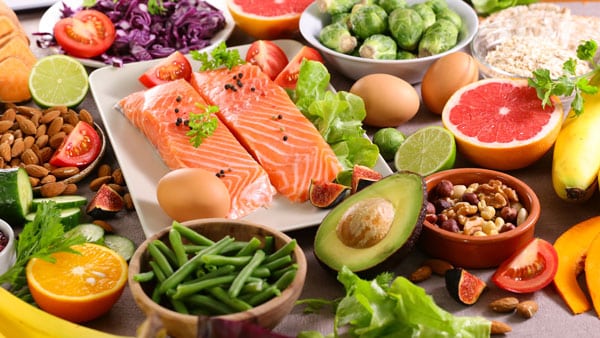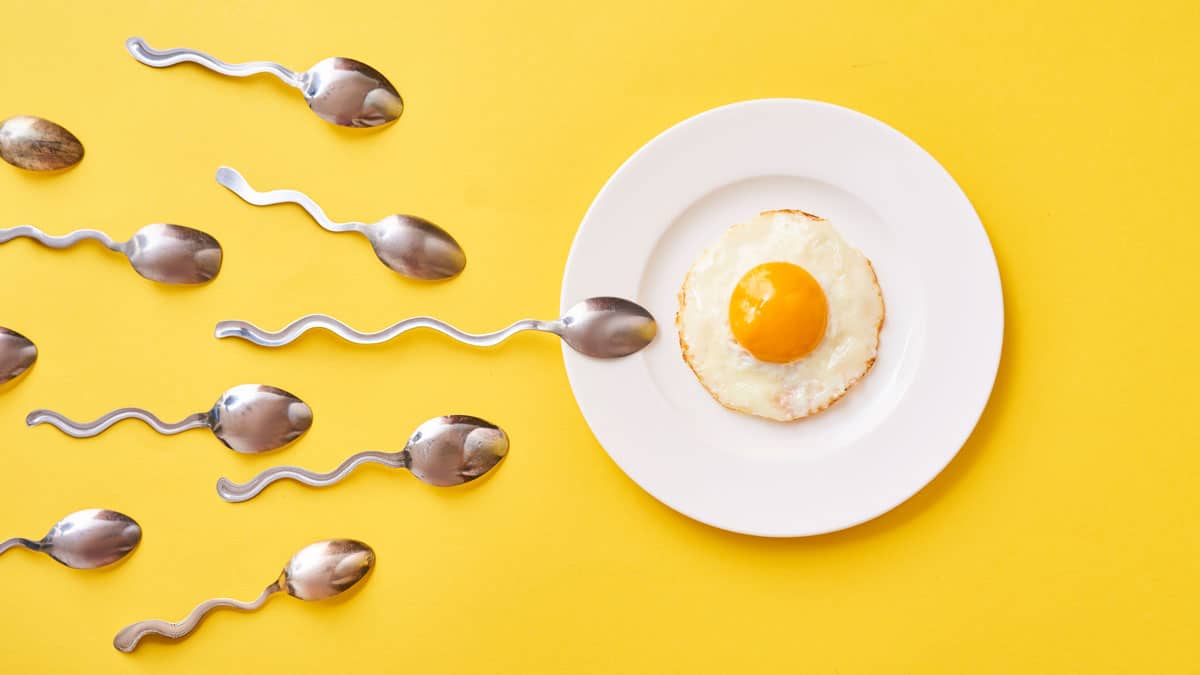According to the latest report from the World Health Organization, one in six people is affected by infertility. Male fertility is not outwardly discussed, but it’s important to address if you plan to grow your family.
Let’s dive deep into sperm health, foods that can impact sperm and practical tips to boost men’s fertility.
Sperm 101: Three essential components of sperm health
It’s true that it only takes one sperm (and one egg from the female) to produce the mini you, but the health of your swimmers determines your fertility success. The quantity, movement, and structure of your sperm are equally essential for one sperm to fertilize the egg.
Under normal circumstances, a single ejaculation discharges at least 1.5 millilitres, with a minimum of 20 million sperm per millilitre. When there is less sperm available, there will also be fewer candidates to fertilize the egg.
You can have a high sperm count, but how the sperm swims (referred to as sperm motility) also matters. In a natural conception between a male and a female, for the sperm to reach the egg, it has to use its tail and head to move through the female’s cervix, uterus and fallopian tubes.
The female’s anatomical environment is not the most ideal for sperm, and many get lost on the way. So, the higher the quantity of mobile sperm available, the better.
Finally, the size and shape (referred to as sperm morphology) of the sperm may also matter. A normal sperm has an oval-shaped head and a single tail that work together to reach the egg. Sperm with abnormal appearances, such as double tails or crooked heads, may have a lower chance of reaching and penetrating the egg.
Importance of a healthy diet for male fertility
Now that you know the anatomy of sperm, you may wonder how your diet plays a role in your little swimmers. Certain factors, like genetics, hormone levels, and the environment, can impact sperm health. But you may be surprised to learn that your diet can influence your swimmers.
Learn how diet can determine your sperm health. If we take a step back, all cells, including those used for sperm production, need the nutrients you get from food to produce and divide.
Foods that boost fertility in men

Vegetables and fruits
Veggies are rich in folate, B vitamins, fibre, and antioxidants like vitamin C, beta-carotene, and lycopene. Together, they help to strengthen sperm. Some excellent vegetables and fruits include spinach, bell peppers, tomatoes, broccoli, oranges, and grapefruits.
Walnuts
Walnuts are a source of selenium, folate and omega-3 fats. Some studies noted that eating 75 grams of walnuts over three months improved the sperm’s motility, structure and lifespan.
Brazil nuts
Brazil nuts are abundant in selenium, but you should only eat one to three Brazil nuts per day to prevent selenium toxicity.
Fish
Fatty fish like salmon, mackerel and herring are excellent sources of omega-3 fats, particularly DHA, which may improve sperm health. Fish is also low in saturated fat and an excellent source of protein.
Oysters
Oysters are also excellent sources of omega-3 fats, zinc, copper, vitamin B12, magnesium and potassium, all essential nutrients for strong swimmers.
Lean proteins
Lean proteins, such as poultry and fish and plant-based proteins, like beans, lentils and tofu, are low in saturated fat.
Whole grains
Whole grains have fibre and do not cause a sudden spike in blood sugar. Some research suggests that foods low in fibre and high in sugar could impact fertility success.
Low-fat dairy products
Low-fat milk, yogurt and cheese are lower in saturated fat and are protein, calcium, and vitamin D sources.
Avocados
Avocados are a source of zinc and an excellent source of vitamin E, essential nutrients for making healthy sperm.
Foods to limit or avoid
Foods high in saturated Fat
Foods high in saturated fat are associated with lowered sperm quality. You can find saturated fat in red meat like beef and pork, whole milk, butter, and tropical oils like palm and coconut.
Processed meat
Processed meat such as hot dogs, lunch meats, and bacon can reduce sperm motility.
Sugary drinks
Sweetened beverages also impact your swimmers. One 2018 study found that drinking more than seven sweetened drinks negatively affects fertility. Plus, consuming fewer sugary drinks reduces the extra calories consumed, improves insulin sensitivity, and more.
Baked goods and sweets
Baked goods and sweets are perfect as occasional treats, as they are low in fibre and high in saturated fat, sugar, and salt.
Alcohol
Drinking occasionally doesn’t affect sperm count, but drinking every day has a negative impact on sperm quality. Drinking less also offers other health benefits, including strengthening your immune system, staying hydrated, sleeping better and reducing the risk of certain types of cancers.
Simple food swaps for a fertility-friendly diet
Eating for improved fertility is easy if you start with simple food swaps. Start with one tip and add others when you are ready:
- Swap sausage and bacon for a leaner protein, like fish, which has high omega-3 fatty acids, for two days a week.
- Swap steak, roasts and meat entrees for a plant-based protein, like beans, lentils, and tofu, at least once a week.
- Swap chips and doughnuts for walnuts, Brazil nuts or fruit for a snack.
- Swap half of your potatoes with other vegetables. The goal is to have half of your dinner plate be colourful vegetables and greens.
- Swap white bread for whole-grain bread.
- Swap white rice for brown rice or quinoa.
- Swap butter for seed oils, like canola, sunflower, or olive oil, for cooking and baking.
- Swap alcohol for a non-alcoholic drink.
Remember that how you eat overall is more important than focusing on what you eat at one meal. You can also speak with a registered dietitian about making healthier food choices based on your health goals.
Other lifestyle factors that impact male fertility
Body weight
Research suggests inflammation and oxidative stress could be linked to poorer sperm quality and quantity in obese men. The relationship between the two remains unclear, and more research is needed.
Still, maintaining a healthy body weight offers numerous health benefits, including a decreased risk of chronic diseases and cancer.
Exercise
Being active helps increase sperm motility, but how exercise improves sperm health is yet not fully understood. Nonetheless, it is still beneficial to participate in regular exercise.
The Canadian Society for Exercise Physiology recommends men engage in at least 150 minutes of moderate to vigorous exercise, participating in muscle-strengthening exercises at least twice weekly.
You don’t have to complete the 150 minutes in one session—you can spread it out over the week, such as doing 30 minutes five days a week. You can also start with doing 5 to 10-minute increments to build up your endurance and comfort level.
Exercise doesn’t necessarily mean hitting the gym—brisk walking, jogging around the neighbourhood, or engaging in a stair climbing workout are good workouts, too!
You can also add resistance band exercises to your workout routine to build and maintain your muscle strength. Check out the 6 Week EZ Guide to Get Fit for tips and ideas.
Stress
Stress, such as life events, can trigger hormonal imbalance, changing sperm production or quality. Like exercise, researchers are still trying to figure out how stress affects sperm health and whether certain types of stress could lead to changes in sperm health.
To manage stress, check out 7 Traits of the Happiest & Healthiest People to learn how to stay happy, positive, focused and energized.
Sleep
Going to bed late and how many hours you sleep impact sperm health. Getting quality sleep, sleeping at least 7 to 9 hours, and sleeping and waking up at consistent times improve fertility and overall health.
Smoking
Smoking reduces the sperm’s quality, including its concentration, structure and movement. Cigarettes contain cadmium and lead, metals that reduce fertility.
Nutrients needed for healthy sperm

These essential nutrients play an important role in making sperm:
Folate: You may have heard about how a woman should eat folate-rich foods and take a folic acid supplement (the synthetic form of folate) during her childbearing years to reduce the risk of congenital disabilities.
Folate is just as important in men—it is vital for making the DNA material carried in the sperm’s head. Folate also supports the production of vitamins B6 and B12, which are also involved with DNA production and play a role in sperm count, motility and quality.
Selenium: Essential for supporting sperm’s motility and growth to an ideal size and shape.
Zinc: Helps regulate the hormone testosterone, protects sperm from getting damaged by free radicals present in the body, and plays a role in the sperm’s motility.
Magnesium: Vital for sperm production, sperm motility and ejaculation.
Calcium: Essential for sperm motility, penetrating the egg’s membrane and fusing with the egg.
Copper: Ensures the sperm functions properly—you only need a trace amount.
Omega-3 fats: The membrane of body cells, including sperm cells, is made with fatty acids, the building blocks of fats. The types of fats that make up each cell membrane could influence how cells communicate with each other and the responses they produce.
A 2022 research published in Antioxidants noted that the fats making up the sperm membrane influence the sperm’s lifespan, motility, and ability to fuse with the egg. Specifically, omega-3 fats have been found to improve sperm quality, quantity, and motility.
Antioxidants: Antioxidants like lycopene, beta-carotene, and vitamin E are found in the sperm membranes, and vitamin C is present in the sperm cells. Together, they protect the sperm from oxidative stress, damaging the DNA and the sperm membrane and causing sperm death.
Research studies also compared the semen analysis between fertile and infertile men—and found that fertile men had higher concentrations of the nutrients above than those deemed infertile.
In other words, including these nutrients in your diet can boost your swimmer’s quality. But focusing on what you eat is also essential, in addition to looking at the specific nutrients, which can also improve your overall health and well-being.
By making healthier food choices, you feel more energized, sleep better, and reduce the chance of getting chronic diseases like type 2 diabetes, heart disease, clinical obesity, and more.
Bottom Line
Make small changes, one step at a time to improve and maintain sperm health and fertility.
Include more vegetables, fruits, whole grains, leaner meats, less processed meats, foods with saturated fat, sugary food, and beverages.
Make healthy lifestyle changes, like more exercise, better sleep and quitting smoking, to improve your sperm health. More importantly, healthier lifestyle choices improve your overall health.
You can make these changes and reach your health goals by talking with your healthcare team.
What is the one thing you’ve tried to help your journey of getting your partner pregnant naturally? Share in the comments below.
Are You at Risk?
Learn your risk level for the most common men’s health conditions in 10 minutes with a free, confidential, and personalized report.



Let’s Talk!
Did you enjoy this article? Let us know in the comments.
0 Comments